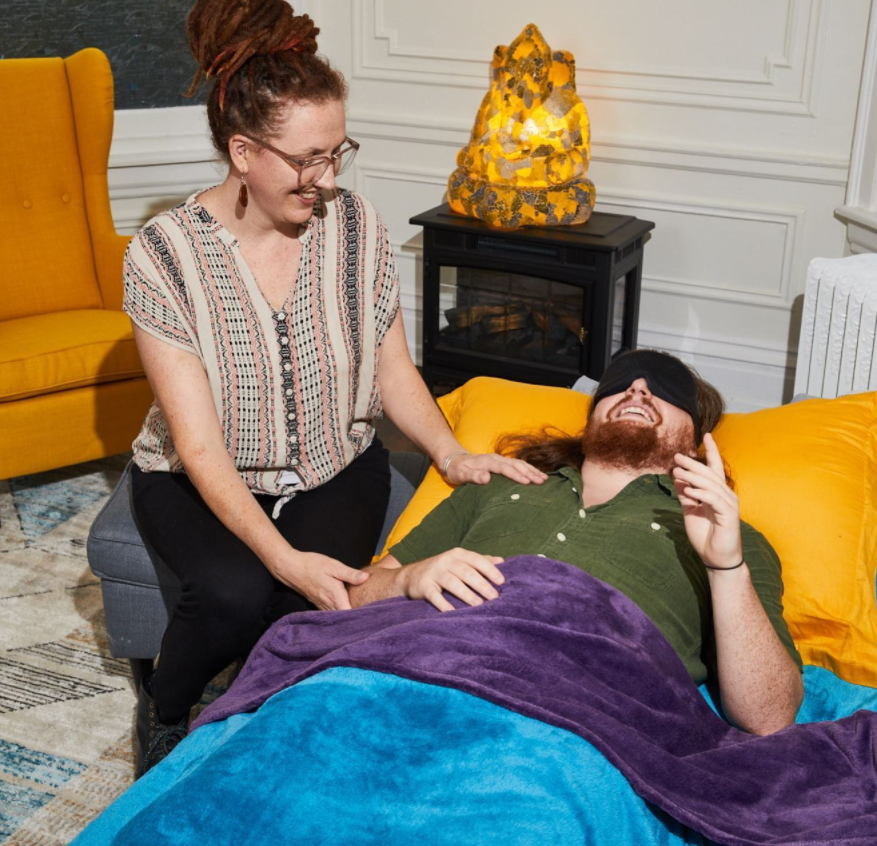By Hannah McLane, Courtney Hutchison, Daniel Wikler, Timothy Howell, & Emma Knighton.
Research into psychedelic-assisted therapy has grown in the past ten years as non-profits, academic institutions, pharmaceutical companies, and even venture capitalists race to develop protocols for using MDMA, psilocybin, ketamine, and other psychedelic substances to treat mental illness. Already, dozens of ketamine clinics across the country administer the medication off-label for depression, and MDMA- and psilocybin-assisted therapy are expected to be approved by the FDA in the coming years.
The use of psychedelics to catalyze psychotherapy represents a paradigm shift in medicine, charting new territory in how to ethically work with patients in altered states of consciousness. A recent string of allegations against clinicians—even against a clinician from an FDA clinical trial–for inappropriate touching of patients during psychedelic sessions has underscored the urgent need for clearer ethical guidelines within this burgeoning field. Given that therapeutic touch (e.g., holding a patient’s hand) is a common aspect of psychedelic-assisted therapy, navigating consent for touch—and how it might shift while patients are under the influence of psychedelics—represents an important ethical testing ground.
Many protocols for psychedelic-assisted therapy cite the use of “nurturing touch” as an “important catalyst to healing”. Because psychedelic experiences can include intense affect states and bring up past trauma, touch helps patients manage anxiety or provide a reparative experience of support and care. To deprive a patient of touch in situations where touch is clinically indicated could replicate past experiences of neglect, but of equal importance, unwanted touch could retraumatize patients.

Though certain lines in clinical ethics are clear (e.g., prohibitions on sexual contact), more challenging issues arise for patients and clinicians alike when previously established patient preferences (e.g., those discussed during informed consent) shift during the session. For example, prior to the medicated session, patients may provide consent to, or specifically decline, having their hand held, only to make an opposite request while under the influence of the medicine. This presents clinicians with a quandary—which request should they abide by?
Though some organizations conducting psychedelic research have moved toward codifying ethics around touch, scant empirical work has been done in the field, and what exists highlights the need for clearer frameworks. These discussions, however, have been limited by a dichotomous view of the self (sober vs. under the influence) that fails to recognize the complexity and nuance of psychological growth and healing during psychedelic sessions.
The mechanism of change in psychedelic-assisted therapy depends on the individual under the influence being, at times, in better touch with their feelings and needs—perhaps more attuned, more integrated, and more rational than the self mired in mental illness. Thus, requiring their choices during intake (e.g., allowing or barring therapeutic touch) to override those made subsequently during session may not only preclude opportunities for healing, but also fail to respect patient autonomy. Psychedelic-assisted sessions frequently generate intense thoughts and emotions—even regression to childlike states—rendering patients uniquely vulnerable. For clinicians, this may lead to a conflict within their fiduciary responsibilities—honoring their patients’ autonomy vs. making good faith efforts to do no harm and promote healing.
One approach to this dilemma is to develop a view of the self as fluidly shifting, where capacity to consent is evaluated by clinicians in partnership with patients both before and during medicated sessions. The literature on trauma-informed practice provides some guidelines for navigating this process, such as trigger mapping to enhance clinician and patient understanding of potentially retraumatizing actions. A further avenue to explore draws upon the ethical literature on advanced directives and Ulysses contracts—a mechanism for committing a future self to desired action used previously in the mental health literature.
Though assessing patient capacity for autonomy is central to these issues, ensuring the capacity of clinicians for ethical practice is also vitally important. The recent allegations of abuse highlight the need to identify clinicians who would use their position to do harm. However, even among the best-intentioned clinicians, the intensity of psychedelic-assisted sessions have been noted to catalyze strong feelings in clinicians, which can in turn increase the risk of boundary violations. This issue can become compounded if dynamics of power, oppression, and privilege go unacknowledged by the clinician, especially when working with marginalized patient populations. Thus, clinicians’ capacity to recognize and manage their own feelings, thoughts, and responses must also be a vital part of ethical discussions and guidelines.
To steer this new frontier in psychiatry toward safe, patient-clinician collaborative practice, further work is needed to synthesize rigorous ethical literature with emerging work on trauma, consciousness, and consent.
Authors: Hannah McLane, Courtney Hutchison, Daniel Wikler, Timothy Howell, & Emma Knighton
Affiliations:
Hannah McLane, MD MA MPH, SoundMind Center
Courtney Hutchison, LSW MSS MPH, Rutgers University School of Social Work & SoundMind Center
Daniel Wikler, PhD, Harvard T.H. Chan School of Public Health
Timothy Howell, MD MA, University of Wisconsin School of Medicine and Public Health
Emma Knighton, MA LMHC, American Psychedelic Practitioners Association
Competing interests: None.
Social media accounts of post authors: Twitter: @HannahMcLaneMD; Instagram: soundmind.institute; Facebook: https://www.facebook.com/soundmindphl